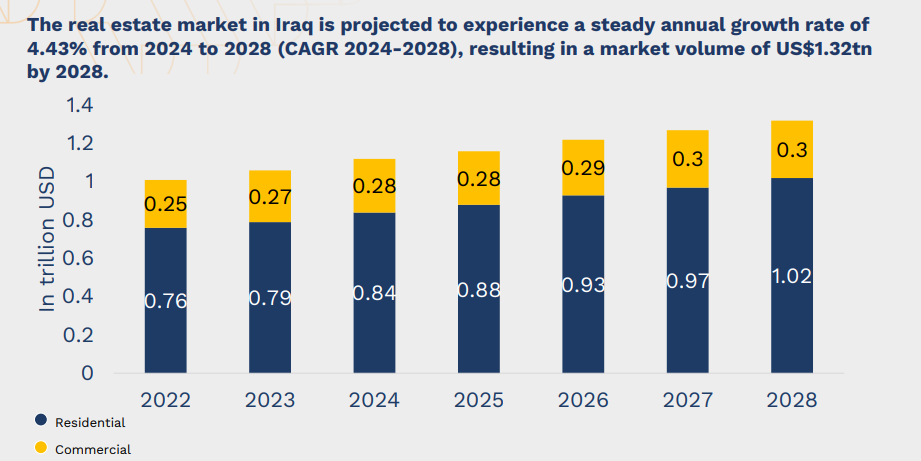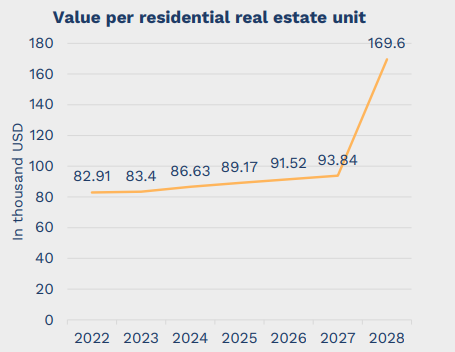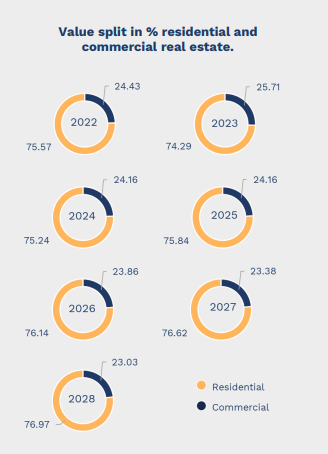With a history of political instability and security concerns, Iraq has long been seen as a no-go for real estate investors and developers alike. However, there has been a significant shift in the Iraqi real estate market in recent years, and in this article, we will take a closer look at the reasons behind it.
Overview
The real estate market in Iraq has long been shaped by a myriad of factors, from political instability to economic challenges and fluctuations in oil prices. Despite the complexities and uncertainties that have characterised the country’s landscape, there have been notable developments and opportunities emerging within its real estate sector.
A primary catalyst behind the expansion of Iraq’s real estate sector stems from the continuous reconstruction initiatives undertaken in the aftermath of prolonged periods of conflict and instability. International organisations, private investors, and governmental initiatives alike have actively endeavoured to rejuvenate infrastructure and stimulate developmental projects.
Residential Real Estate
Iraq has a population of over 40 million people, with a large percentage being under 30 years of age, triggering a shift in the population’s real estate preferences. The young, growing population is a driver behind the increase in residential real estate as they look to either rent or buy their own homes.
Furthermore, prospective buyers are actively pursuing properties situated in secure and well-serviced neighbourhoods, boasting convenient access to schools, medical facilities, and other essential amenities. Another notable trend in the market is the rise of the luxury real estate sector. Iraq’s robust and varied economy, encompassing pivotal industries like oil and gas, agriculture, and manufacturing, has resulted in heightened levels of disposable income and purchasing power.
Consequently, there is a rise in demand for upscale properties, with affluent individuals and investors gravitating towards luxury apartments and villas as a means of both safeguarding wealth and diversifying investment portfolios. Government initiatives to attract foreign investment, combined with low interest rates and favourable mortgage opportunities, have boosted the growth of high-end residential real estate. This trend is particularly prominent in cities like Basra and Sulaymaniyah, where there is a growing affluent population.
Commercial Real Estate
The commercial real estate market in Iraq is influenced by several local special circumstances. One of the key factors is the ongoing reconstruction efforts in the country following years of conflict and instability. The government is investing heavily in infrastructure development, including roads, bridges, and public facilities, which is driving the demand for construction and real estate services. This presents significant opportunities for developers and investors in the market.
One of the key trends in the Iraqi real estate market is the increasing demand for commercial properties, particularly in major cities such as Baghdad and Erbil. This is driven by the growth of various industries, including retail, hospitality, and healthcare, which are expanding their operations and require suitable spaces for their businesses. As a result, there is a steady demand for the construction of commercial complexes and office buildings.
Government initiatives
Several macroeconomic factors are driving the development of the real estate market in Iraq. The country has a strong and diversified economy, with sectors such as oil and gas, agriculture, and manufacturing contributing to its growth. This has resulted in an increase in disposable income and purchasing power, which is driving the demand for real estate.
Furthermore, Iraq has a favourable investment climate, with the government implementing reforms to attract foreign direct investment. This has led to an influx of international investors in the real estate market, who are bringing in expertise and capital to support the development of the sector. The government is also implementing policies to support affordable housing initiatives, which is further fueling the demand in the market.
Conclusion
The Iraqi real estate market is undergoing notable expansion and evolution, driven by a surge in demand for modern, comfortable living alongside a spike in interest in commercial and upscale real estate offerings. This growth is underscored by unique local dynamics, including ongoing reconstruction endeavours and a young demographic landscape, which are serving to bolster market momentum. Furthermore, favourable macroeconomic conditions, characterised by a robust and diversified economy coupled with an inviting investment climate, are fostering the sector’s advancement.
As Iraq continues to chart its course towards stability and economic prosperity, the real estate market remains both a challenge and an opportunity for investors. Major cities like Baghdad, Basra, Erbil, and Sulaymaniyah have witnessed significant activity in construction and investment, driven by factors such as population growth, urbanisation, and the demand for both residential and commercial properties. These urban centres serve as focal points for potential investors seeking to capitalise on Iraq’s evolving real estate market.
However, it’s essential for investors to tread cautiously and be well-informed about the unique dynamics at play. While efforts have been made to address these issues and stimulate economic growth, navigating the landscape requires a nuanced understanding of Iraq’s geopolitical realities. Partnering with experts familiar with the intricacies of the Iraqi real estate market can provide invaluable insights and mitigate risks associated with unfamiliar terrain. These local insights can help investors navigate bureaucratic hurdles, identify promising opportunities, and forge strategic partnerships with key stakeholders.






